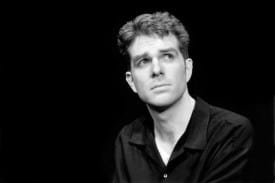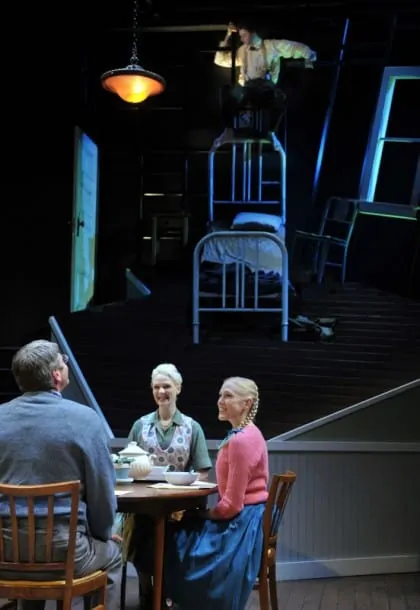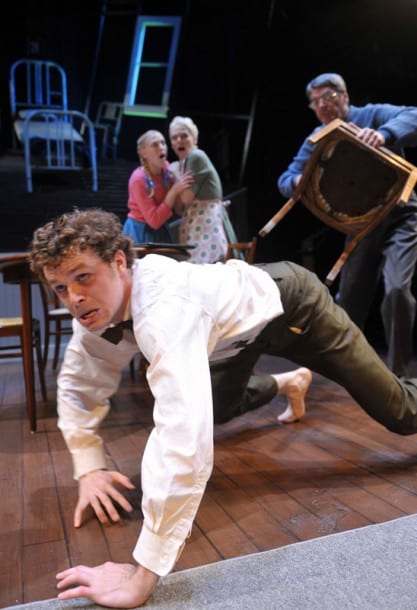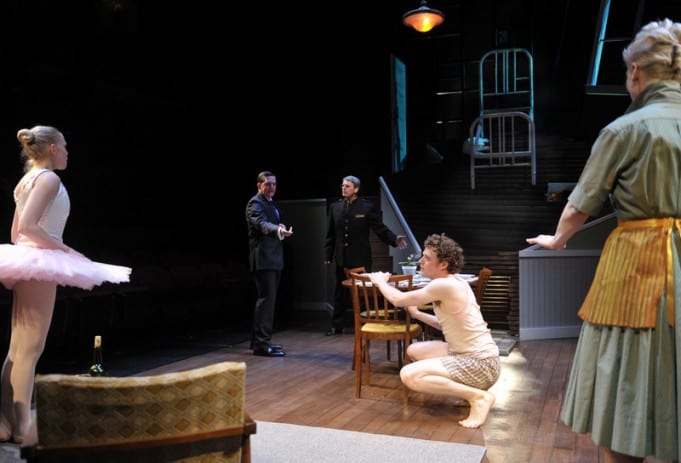Growing up I owned a bookmark with an interesting suggestion: “Eat a bullfrog first thing in the morning and nothing worse will happen to you the rest of the day.” Many a night it made me smile and gave a then twelve-year-old boy momentary relief from King’s wicked The Shining. But what would happen if you woke up one morning only to discover you had (somewhat) shockingly become a bug? An insect! Surely, that would be one heck of a way to put kick into your step(s).
The very idea, of course, is the premise of Franz Kafka’s 1915 masterpiece, The Metamorphosis. Now the story, which opens with a traveling salesman discovering he has been transformed into a monstrous insect-like creature, is hitting the Berkeley stage. The play premieres Thursday at Aurora Theatre, and I had a chance to discuss the rather prickly notion of a literal bug’s life with the director, Mark Jackson.
One of the sweet servings of theater is that it keeps your mind humming. And once again I found myself Googling in advance of a show; looking for as much as I could find about Kafka, his novela, and the upcoming Aurora production. Then I wondered, how long had it been seen I had read The Metamorphosis? I couldn’t recall. So I downloaded the Kindle version (the bugger only costs 0.99) and am happy to report it’s as gripping, odd, fantastical as I remembered reading so many times in high school. I wouldn’t necessarily throw myself into the Cronenberg ring quite yet, but horror and absurdy are about a delicious a combination as one could ever want.
Stark Insider: A man wakes up as a bug. Is this worth a laugh or two, or cause for horrific astonishment?
Mark Jackson: Both! That’s Kafka’s brilliant stroke, and Farr and Gardarsson’s stage adaptation is very true to that mix of humor and horror.
SI: The Metamorphosis is widely regarded as Kafka’s masterpiece. When you approach this work, what’s the thought process: are you thinking, I better not screw this up and try to stay true to the original material… or is it a chance to bring a fresh perspective to the stage?

MJ: The production isn’t the Kafka novel. It’s a piece of theater. So, the “original material” that I try to stay true to is the script. Theater is a quite different medium than a short story or novel. But what they both share is a reliance on the imagination of the reader/audience. And with his emphasis on metaphor and situation, Kafka’s work lends itself well to theater. METAMORPHOSIS wouldn’t make as good a film, I think, because the bug would inevitably be rendered in CGI, leaving nothing to the audience’s imagination. The script is very true to Kafka’s story in that it allows the metaphor to be quite open, so that the audience can find their own life experiences in it. That is what gives it such a polyphony of resonances. I’m not worried that a Kafka scholar might balk because the script and production changes this or that detail. Changes must be made in adapting it for the stage. And of course Kafka’s story remains readily available to be read if one wants to return to it.

SI: How does being an actor/performer alter the way you direct? Or does it?
MJ: That I also perform definitely impacts my directing, and visa versa. Like any actor, I have my own way and in my case it is very physical, so I can relate best to actors who also have a strong kinesthetic sense. It’s not possible to click perfectly with everyone, of course. But I think wearing multiple hats has helped me to have multiple perspectives and, I hope, to be more helpful to actors than I might be otherwise since I know what they’re going through firsthand. I know how stressful it is to have a million new things thrown at you during tech rehearsals, for example, and so I always push to have as many production elements as possible early on in rehearsal. I also have a good sense, I think, of how as a performer to interact with design, so that my acting collaborates with the design. I direct with this in mind. As an audience member, I don’t like it when the designers’ work and actors’ work are essentially separate. One can feel that disconnect, even if only subconsciously. Creating unity between all the elements that make it theater is important, and I think wearing different hats has helped me to do this.
SI: David Cronenberg’s The Fly (1986) is one of my favorite spins on the story (though not an adaptation of The Metamorphosis), and also Naked Lunch pours on the insect psychedelia. What does this fascination about all things buggery tell us about ourselves, and is there deeper meaning here?
MJ: Oh yes there is quite a deep, and primal, meaning. But I couldn’t say what that is definitively. Everyone must do that for him or herself. And I’d guess anyone’s answers would change with time. Again, Kafka’s brilliance was to not lock down the bug metaphor to any single meaning. This is a significant reason as to why METAMORPHOSIS has had such a powerful international impact, and continues to be so affective decade after decade. Bugs themselves can be cute, scary, beautiful, ugly, deadly, helpful, hard working, destructive. But one can never know what they are thinking. Maybe it’s this last bit that really scares us, that we can’t control or understand them intellectually. That unnerves people. And yet there is something admirable about insects, be it their stealth, resilience, organization, or the like. So our relationship to them is mixed. That makes them fascinating, I think.

SI: You’re a busy guy. You’ve been directing all over the Bay Area, and San Francisco’s EXIT Theater’s EXIT Press just published Ten Plays, your first collection of plays. What’s your take on the state of theater in the Bay Area?
MJ: The state of theater in the Bay Area? That’s a big question. A simple summation couldn’t possibly be accurate, so I’m loathe to attempt such a thing. Maybe it’s enough to say that Bay Area theater, like the American theater of which it’s one part, is working hard, and sometimes well, despite a profound lack of understanding in our society as to theater’s social role. I think even some people working in the theater don’t have this understanding, and have reduced the art to a business, which just doesn’t work in the long run and is an attitude that has done much to harm the American theater. I also think, and I’m by far not the first to say it, that we who make theater don’t help the situation when we do not respect our audience enough to trust their intelligence. Even if an audience might not always think they want to go to the theater to think, when given the chance they will, and with gusto! It’s important to be honest and generous with the audience, and I believe we are not doing that when we serve up only what we think they’ll buy, or their expectations, which, as Pina Bausch said, are just stupid cliches. We shouldn’t treat audiences like customers. We should treat them like the collaborators they are. …There. You see? I can’t answer this question simply. I’ll stop there. :-)
SI: BONUS round, the Stark 3, rapid-fire:
Your favorite …
… food/dish?
Oh, too many to name one favorite. But I do like me a good German sausage with a side of Spaetzle.
… adult beverage?
A good pinot noir. Or a good pilsner.
… gadget?
My MacBook Pro is my office.
Thanks Mark. And, remember, don’t let the bed bugs bite.
Metamorphosis opens Thursday June 16
Aurora Theatre, Berkeley
Photo credit: David Allen.


